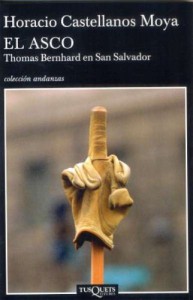19
Followers
19
Following
M Sarki
Besides being a poet with four collections published, M Sarki is a painter, film maker, and photographer. He likes fine coffee and long walks.
M Sarki has written, directed, and produced six short films titled Gnoman's Bois de Rose, Biscuits and Striola , The Tools of Migrant Hunters, My Father's Kitchen, GL, and Cropped Out 2010. More details to follow. Also the author of the feature film screenplay, Alphonso Bow.
Currently reading
L'Appart: The Delights and Disasters of Making My Paris Home
We Learn Nothing: Essays
Elmet: LONGLISTED FOR THE MAN BOOKER PRIZE 2017
Limbo, and Other Places I Have Lived: Short Stories
The Double Life of Liliane
At Home with the Armadillo
American Witness: The Art and Life of Robert Frank
Autumn
Inside Out: A Personal History of Pink Floyd (Reading Edition)
American Witness: The Art and Life of Robert Frank
 Revulsion: Thomas Bernhard in San Salvador
Revulsion: Thomas Bernhard in San Salvadorby Horacio Castellanos Moya
translated by Lee Klein
A short book and one that is specifically one-sided. An incessant rant by a character named Edgardo Vega directed to, I suppose, anybody who might be listening, but in this case even more pointedly at the character Moya himself as receptor. It is also the author Moya who is relating this tale, though the words come all from the mouth of Vega.
Early on I was a bit distracted by the obvious attempt at a Bernhardian rant, but I continued on with my reading in the spirit of some of my own vitriol and those of others I have known who have let it all out and used me as their sounding board. Thomas Bernhard certainly wasn't the first person to ever behave this way in person, but perhaps he was the first we serious readers had noticed doing so on the page. I continued on with my reading of Revulsion because I have known several inflicted people like this who would not have a clue who Bernhard is and would most likely care less if they did. These people for the most part do not read and are not interested in anything but the made-for-TV film version to make its way on to their cable network. In the end, what is important to me is what the rant is dealing with, from which the complaint derives it substance from, and if the rant can sustain itself and keep me interested. Obviously, this rant did or I would not be writing about it.
I have a mentor who is extremely judgmental, said to be tyrannical even, and refuses to read translations of any stripe. The irony in his rigid stance here is that he says to all he teaches to that he loves the work of Gilles Deleuze and Thomas Bernhard, just to name two, and both of these writers are not of the same English-speaking ilk that he is. The work of both of these writers has been translated, one from the French and the other from the German, and I know for a fact my famous friend knows no other language than his own. So when I express to him my delight in finding new authors, new for me anyway and an exercise he seems to encourage and respect, new foreign writers for me such as Moya, or Walser, Sebald or Zweig, translated authors who flat knock me out, my mentor is not interested and refuses to even take a look at them. Or if I were to inform him that a certain someone such as Moya has written an amazing book such as [b:Senselessness|2635557|Senselessness|Horacio Castellanos Moya|http://d202m5krfqbpi5.cloudfront.net/books/1348630122s/2635557.jpg|2660267] that brings to mind the rantings of a lunatic not heard of since Bernhard made his mark on him he would say, without a doubt in my mind, that these types of rantings on the page are best left to the Bernhard master of them all and for others to do something unforgettable on their own of merit and to quit copying what others have done before them. The problem for me with this statement is that the fiction of my own good friend is often compared to Bernhard and whose words are constantly reminded of the great Austrian especially in his sometimes uniquely personal and intensely crazy rantings of his own.
The way I look at all this discussion above of who did what and if it is meritorious or not comes down to simply whether or not it has its own voice and if the subject is interesting. When I read Thomas Bernhard I hear his voice, and what he speaks of is instructive and tantalizing. When Max Sebald reveals his disdain for something or other I hear his particular voice and find his arguments and complaints quite captivating as well. Same goes for [a:Gordon Lish|232097|Gordon Lish|http://d202m5krfqbpi5.cloudfront.net/authors/1267719924p2/232097.jpg], Samuel Beckett, and now even Horacio Castellanos Moya. And to be fair I will even mention myself and the character of Ponzil in a short story I published only recently. What I do not understand however is why this novel Revulsion has not been published in our English language yet. I have read the reasoning and explanation provided by Lee Klein who has transcribed his well-worded English translation of Moya's book and has so far not found a publisher to make it available to readers of our own language. It is striking to me to note that Bernhard was beloved by his own country, and many prizes were bestowed on him which Bernhard also used against them. Perhaps the greatest difference between the writers mentioned above and the writer Moya is that in this particular story there wasn't anything mentioned of worth beholden to his country. Not only did Vega hate the people, he hated the geography and the weather. It is possible there is far too much truth in Vega's words, and Moya's countrymen simply do not appreciate it. But why the great powers of North America care about putting a bad light on El Salvador is beyond me. It isn't something I am accustomed my own country, in general, caring two hoots about.
All of us, at times, might have a moment for expressing our rants. But the onus is on the ranter to make our tirades interesting and well-written if they are to be actually published in a book. The voice must be our own. But come on here, ranting is ranting. Crazy talk is crazy talk. I confess that voicing my own hatred and vitriol at times feels rather good and freeing, and is something I also like to read of others doing in order to assuage or rid myself of my own personal misanthropic feelings for my fellow countrymen and certain obstacles in my path in realizing my innermost desires. Just because Thomas Bernhard has performed his rantings on the page in the most gifted of literary form is not a good enough reason for other writers to not speak their own mind or express what their bodies are provoking in these quivering and twitching mannerisms incessantly invading them. It is a breath of fresh air for me, though I am positive there are examples of this style that are purely unacceptable, and I am also sure there is enough poor work I would absolutely detest and scorn if given the opportunity to read it. But not this one. This book was good. Especially Edgardo Vega relating to us his ride on the crowded plane to San Salvador and the disgusting fellow passengers spreading their own sweaty filth on our unfortunate and terminally unhappy narrator. Thank you [a:Lee Klein|206003|Lee Klein|http://d202m5krfqbpi5.cloudfront.net/authors/1270664306p2/206003.jpg].







